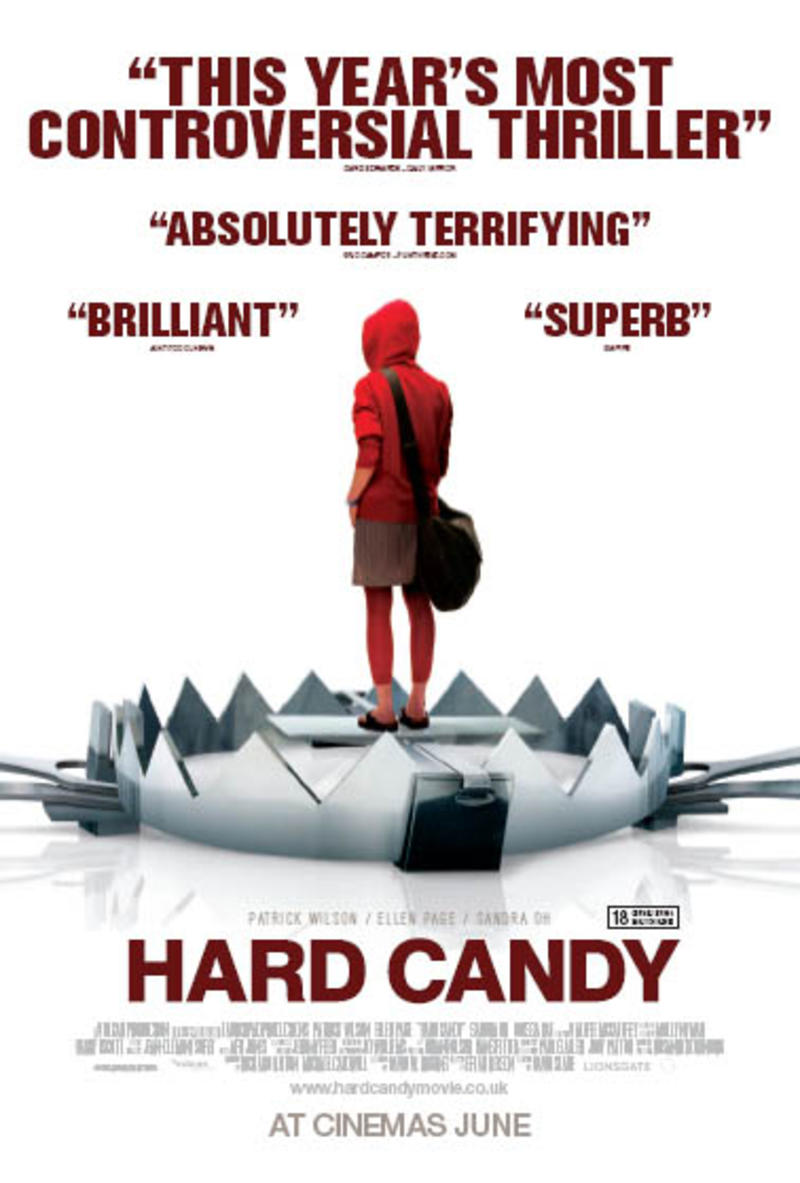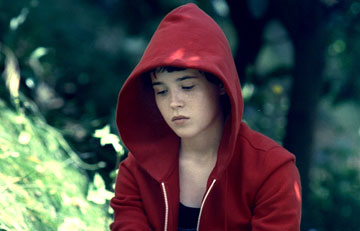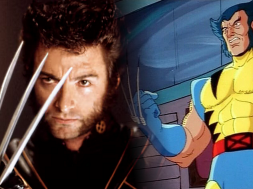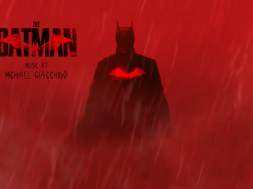
I first heard about Hard Candy years ago, so when I say I’ve been meaning to see it forever it’s almost not hyperbole. Feels good to cross a film (book, album) off ‘The List’, the ominous, ever-growing ‘List‘. Still, one of the worst things about relegating anything to ‘The List’ is that expectations are high. Fortunately, Hard Candy does not disappoint. It’s also fortunate – perhaps – that I didn’t see the film sooner. Brian Nelson’s concoction was released back in 2005 by director David Slade (both of whom worked together on the film 30 Days of Night). I like to think that I could have handled it back then but, were I given the opportunity to prove it, I might just decline.
Certainly I was not nearly as advanced as character Hayley Stark, played by Ellen Page. Page’s performance might easily foretell her success, acting opposite the Patrick Wilson with whom she carries the film. At this point a spoiler alert might be previous, the release date was nine years ago. I certainly cannot stop you reading from this side of the keyboard, but if you haven’t seen the film proceed at your own expense…
 The film belongs to a genre that can be traced at least as far back as Henry James’ seminal short story The Turn of the Screw, which Oscar Wilde described as “a nasty, lurid, poisonous little tale” (how’s that for an endorsement?). The story, detailing the strange relationship that a young governess has with her charges, mounts tension as it builds ambiguity within that relationship. The crucial difference (besides setting) is that while the tale focuses on the children as objects of desire (especially Miles), the Slade-Nelson film focuses on the object of vengeance (Wilson’s character Jeff Kohlver). The film begins with 14 year old Hayley meeting an older man, Jeff, for coffee. The scene establishes the claustrophobic atmosphere that characterises the film. The dialogue up to this point is dubious, especially Wilson’s lines. They decide to re-locate to the Jeff’s home, a small house whose size further emphasises the film’s claustrophobic feel. When they arrive, alcohol is introduced into the exchange and with it the immediate threat increases.
The film belongs to a genre that can be traced at least as far back as Henry James’ seminal short story The Turn of the Screw, which Oscar Wilde described as “a nasty, lurid, poisonous little tale” (how’s that for an endorsement?). The story, detailing the strange relationship that a young governess has with her charges, mounts tension as it builds ambiguity within that relationship. The crucial difference (besides setting) is that while the tale focuses on the children as objects of desire (especially Miles), the Slade-Nelson film focuses on the object of vengeance (Wilson’s character Jeff Kohlver). The film begins with 14 year old Hayley meeting an older man, Jeff, for coffee. The scene establishes the claustrophobic atmosphere that characterises the film. The dialogue up to this point is dubious, especially Wilson’s lines. They decide to re-locate to the Jeff’s home, a small house whose size further emphasises the film’s claustrophobic feel. When they arrive, alcohol is introduced into the exchange and with it the immediate threat increases.
Eventually, Jeff loses consciousness and when he awakens whatever expectations he may have had are revealed to fall drastically short of his present circumstance.
Now, that’s enough exposition. If you continued reading this without watching the film, stop here – seriously, I’ve given enough of the game away already.
The film builds tension in of two opposing emotional forces: pedophilia and pedophobia. Two psychological states typically regarded as mutually exclusive are thrown together. Hayley (Page) is a child in law yet, with her esoteric knowledge and grammatically perfect syntax, seems old. Indeed, Hard Candy not only treads the same ground as James thematically, it share his story’s preoccupation for language. Hayley alludes to her designs on Jeff at the outset When asked about herself she refers to herself as a Goon. The opaque word choice captures the image she projects and the genuine intentions towards her would-be seducer. Respectively, a goon may refer to a silly, foolish, or eccentric person, a definition perfectly captures her stick in the mud, introverted adolescent persona. Goon, however, is a polysemic term, referring also to a bully or thug. One can apply both terms to  Hayley in equal measure. By the end Hayley has become Jeff’s reckoning, identifying as, “every girl you ever watched, touched, hurt, screwed, killed”. As the film poster shows, Hayley subverts the not only audience expectation but (note the wardrobe choice) the red-riding hood archetype, revealing herself as anthropomorphic retribution.
Hayley in equal measure. By the end Hayley has become Jeff’s reckoning, identifying as, “every girl you ever watched, touched, hurt, screwed, killed”. As the film poster shows, Hayley subverts the not only audience expectation but (note the wardrobe choice) the red-riding hood archetype, revealing herself as anthropomorphic retribution.
Having seen the film I talked over the internet with a friend. While he enjoyed the film he was not as enthused as I. His complaint was/is that the film depicts events that are morally questionable up till the confirmation of Jeff’s sexual transgression. That is, the film has a definite tension until Jeff is revealed to be a pedophile. Once it is confirmed he found that the film valorises Hayley, possibly implying that her actions are justified, or at least had good cause. As he put it: “he is a terrible person who in the end if forced into suicide by another terrible person… Not knowing made it more morally questionable” – the source of the tension central to the film.
On these matters, I could not agree. Hayley is impressive as a character, but it would be a stretch too far to call her “likable” or to say the film sides with her. Hayley’s vigilante justice is her responding to one injustice with another, with the justification that her wrong-doings are vindicated by Jeff’s (previous) wrong-doings. Under scrutiny such justification does not hold water, but ultimately that’s not the point, and neither is it whether or not you (the hypothetical audience member) like her. Certainly, the ambiguity that has sustained the film hitherto dissipates, at which point the tension of the narrative falters. That said, I contend that it gives way to new tension. By the end shear exhaustion has rendered Wilson’s character almost pathetic (while not sympathetic). However, his exhaustion mirrors that of the audience. So much so that there is a definite release that comes  when he finally dies. The tension is such that the audience is willing it to come (“Die already!”). In that instant the ambiguity shifts from the characters’ identity to the audience’s reaction to their identity.
when he finally dies. The tension is such that the audience is willing it to come (“Die already!”). In that instant the ambiguity shifts from the characters’ identity to the audience’s reaction to their identity.
The tension that Hayley is instrumental in building becomes so much that the audience, almost coerced, is willing to give her what she wants, horrific though that is. The film comes to a head in such a way that you, the audience, are glad of an atrocity because it will allow you to draw breath; by willing his death you have been made complicit in it. Consequently, the film has a satirical edge that comments not only on a stylized brand of vigilante justice but capital punishment. Criminals (convicted or not) are a class of people who it is socially acceptable to disregard as human beings. Just as killing a criminal is convenient for the state, killing Jeff is ultimately a selfish act for the audience, as demonstrated the relief immediately thereafter. In that sense, an ambiguity remains at the close, that remains not in spite but because of the revelation. For most of the film you are wondering who is who (or who perhaps what). By the end you know who is who but you do not how to react to said knowledge. Jeff is a terrible person but in the moment of his death you have all but acquiesced to the will of another terrible person for the simple reason that it makes you feel better.
Alas I could not agree with my friend, but I don’t imagine he’ll hold it against me. As for the movie, I found it a brilliantly un-housing film.
8/10









